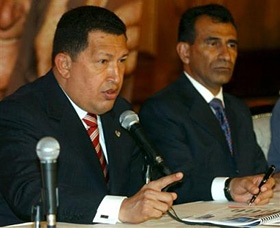 |
 |
 |
 News from Around the Americas | February 2006 News from Around the Americas | February 2006  
Venezuela Cautions US It May Curtail Oil Exports
 Juan Forero - NYTimes Juan Forero - NYTimes


| | Venezuela's President Hugo Chavez speaks from Miraflores presidential palace in Caracas, Venezuela, where he warned that he could cut off oil exports to the United States if Washington continues trying to destabilize his left-leaning government. (AP/Daniel Galli) |
Bogota, Colombia - Venezuela's oil minister, in blunt comments published in a Caracas newspaper, warned the United States that it could steer oil exports away from the United States and toward other markets.

The minister, Rafael Ramírez, said Venezuela, which is the world's fifth-largest oil exporter and supplies more than 10 percent of American oil imports, could act in the face of what he described as aggression by the Bush administration.

Although such warnings have become part of President Hugo Chávez's verbal arsenal against the Bush administration, the comments by Mr. Ramírez, coupled with the increasing sale of oil to China, are seen by oil experts and political analysts as a signal that Venezuela is serious about finding new buyers.

"Physically it's very feasible, and politically it's very feasible," said Lawrence Goldstein, president of the Petroleum Industry Research Foundation, a New York policy analysis group financed by the industry. "It comes with an economic penalty, but apparently Chávez is willing to pay that price."

That economic penalty comes in the increased costs to transport crude from oil-rich Latin America to as far away as China and India, two fast-growing, energy-hungry giants that are eager to buy Venezuelan oil. China is a 30-day tanker trip from Venezuela, while the United States is just 5 days away and is well-equipped to refine the heavy, highly sulfurous Venezuelan oil .

Mr. Chávez's government, which has increasingly been sparring with the Bush administration over everything from the Iraq war to the Venezuelan leader's close ties to Cuba, is moving swiftly to forge energy ties with China. Venezuela has said that this year it will double exports to China, to 300,000 barrels a day. Venezuela ships about 1.5 million barrels a day to the United States.

Mr. Ramírez, in an interview with the daily newspaper Últimas Noticias, played down the hurdles in replacing the United States as a buyer. "We're prepared to diversify our markets and will work toward that," he was quoted as saying. "The easiest thing is locating it. That will not be a problem."

Echoing Mr. Chávez's fears of an American attack on Venezuela, Mr. Ramírez said that Venezuela would respond by shutting off exports. To consume more Venezuelan crude, China would have to configure more of its refineries to process Venezuela's particular type of crude. Venezuela also would have to increase its fleet of tankers and build a pipeline to Colombia's Pacific coast.

The threats out of Caracas have not been lost on the White House, high-ranking American military officials and Republicans in Congress, who in public hearings and closed-door sessions have addressed both Mr. Chávez's warnings about diversifying oil markets and China's increasing role in Latin America.

"I think they're not as quick to dismiss his bluster as they used to be," said Michael Shifter, a senior analyst at the Inter-American Dialogue, a Washington policy group that follows American-Venezuelan relations.

"His intention to switch his markets away from the United States is quite clear," Mr. Shifter said. "The question is, does he have the capacity to carry it out and how quick could he carry it out. The concern in the White House is that he's moving more quickly than they thought he was able to move."

Oil analysts say that if Venezuela does shift markets, the United States would be able to find other suppliers, but it would take time and cost more. "It's a global, homogeneous market, so if China gets supplies from Venezuela, then they're not getting supplied from the Middle East and elsewhere," said Mr. Goldstein of the petroleum foundation. "That all then becomes available. There's no change in supply. There's a change in redirection of supply, at a higher cost." | 
 | |
 |



